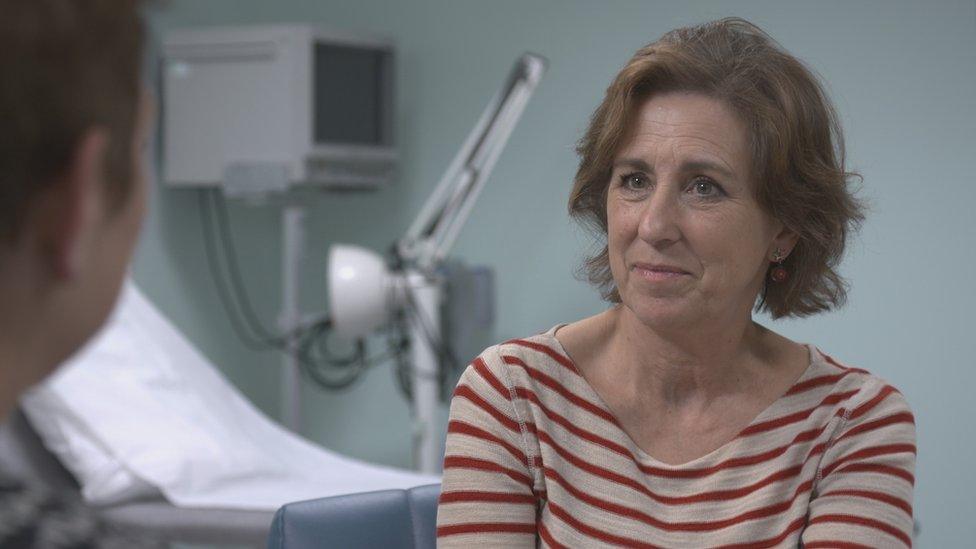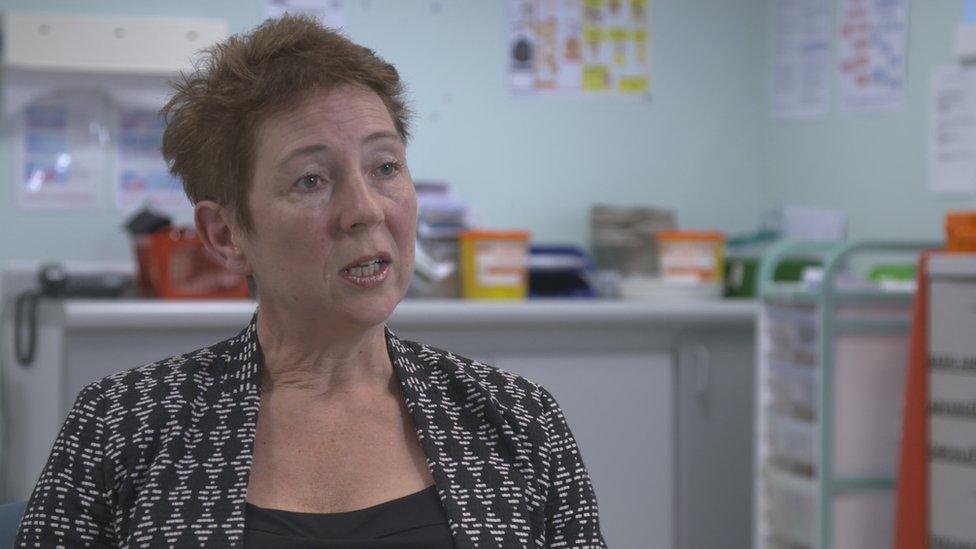Kirsty Wark: 'Let's talk about the menopause'
- Published

Kirsty Wark took a personal journey to find out about the menopause
BBC news presenter Kirsty Wark began her menopause at the age of 47 after having a hysterectomy. She thinks women are still "shockingly ill-informed" about what it actually is and how to deal with it.
"Every woman goes through the menopause but there is something about the word itself which has these negative connotations of ageing and atrophy," says Kirsty in a BBC Scotland documentary, The Insiders' Guide to the Menopause.
"In our youth-obsessed culture that is debilitating for women, even embarrassing.
"We are all living longer and the menopause is a feature of mid-life. It's the start of a new chapter, so why the persistent taboo?"
Kirsty Wark gets the low down on Jennifer Saunders’ menopause.
Hot flushes, night sweats, mood swings, loss of libido and vaginal dryness are all possible symptoms of the menopause and reasons why women do not often discuss it.
For some women you can also add joint pains, dizzy spells and headaches.
The majority of women experience the transition between the ages of 45 and 55 - with the average age being 51.
Women usually go through the menopause in about four years but the range is up to about 12.
Dr Heather Currie, chairwoman of the British Menopause Society, says: "Sadly our ovaries are only designed to last a certain number of years.
Kirsty Wark and Kaye Adams reveal all as they compare their menopauses live on radio
"We produce egg cells on average up to the late 40s and early 50s. By the age of 51 women are stopping having periods.
"The reason periods stop is that women run out of egg cells.
"But the complicated thing is that we now live many years beyond that.
"When our ovaries are not working the key hormone that we stop producing is oestrogen."
One of the consequences of a lack of oestrogen can be osteoporosis, a condition in which the bones become brittle and fragile.
It has recently been estimated that by the age of 70, half of all women will have had a fracture related to osteoporosis.
Prof Mary Anne Lumsden, professor of medical education and gynaecology at the University of Glasgow, says: "Many of us are of a generation who have watched our mothers experience the effects of osteoporosis with multiple fractures and decreased mobility, a loss of confidence.
"It's an awful disease.
"It is extremely common, particularly in women."
According to Prof Lumsden, Hormone Replacement Therapy (HRT), the common treatment for menopausal symptoms, does not prevent fractures but it decreases the likelihood.
HRT, which can be taken via patches or as a gel or tablets, helps to replace the oestrogen lost when a woman's ovaries stop producing eggs.
However, the publication of the women's health initiative study in America in 2002 cast serious doubt on the safety of HRT, making a link to an increased risk of breast cancer.
Over the past 15 years other studies have highlighted potential risks and some women and doctors have been reluctant to use HRT.
Kirsty Wark, who is now 62, says: "I was on HRT for three years after my hysterectomy but stopped suddenly because of this scare.
"I came off HRT and actually my symptoms have not really gone away in the past 10 years."
Subsequent research suggests that the analysis of the data in the 2002 study was flawed and the findings were overstated.
However, these positive reappraisals of HRT received nothing like the same publicity as the original scare.
More up-to-date research has attempted to provide clarification of the risks involved.
The National Institute for Health and Care Excellence's (NICE) new guidelines say that the risks of HRT are small and are usually outweighed by the benefits.
Dr Currie says: "The current understanding is that if women take oestrogen only - which is taken if the woman has had her womb removed, had a hysterectomy - then there seems to be very little increased risk of being diagnosed with breast cancer.
"If women take HRT, which is oestrogen and progestogen - which is added to protect the lining of the womb - for more than five years after the age of 50 there is a possibility that there is an increased risk of being diagnosed with breast cancer."

Dr Heather Currie, of Dumfries and Galloway Royal Infirmary, says the benefits of HRT outweigh the risks
Dr Currie says being overweight and drinking more than the recommended amounts of alcohol are also risk factors for breast cancer.
"Being overweight is a far greater risk factor than taking HRT," she says.
"The feeling now is that for women who are having a menopausal symptoms - for most women - the benefits of HRT outweigh the risks.
"It is the most effective treatment that we have for controlling the symptoms."